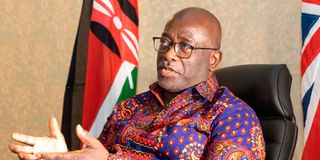Easier travel as UK removes Kenya from Covid-19 'red list'

Unused check-in desks at Heathrow airport Terminal 5 in west London on September 9, 2019.
What you need to know:
- Kenya is among eight countries that will move from the red to the amber list. The others are Bangladesh, Maldives, Oman, Pakistan, Sri Lanka and Turkey.
The UK has removed Kenya from its controversial 'red list' in a move that will ease travel for thousands who traditionally used London as a connecting hub, and improve passenger traffic.
The decision, announced Friday, which takes effect at 4am on September 22, is part of a series of changes that will see the current system of restrictions abolished and a new type of regulations introduced from October which will focus on vaccination status.
Kenya is among eight countries that will move from the red to the amber list, the others being Bangladesh, Maldives, Oman, Pakistan, Sri Lanka and Turkey.
The amber category is a rank lower than red, which has countries considered too risky due to many cases of Covid-19 or poor surveillance to prevent infection.
The decision means people travelling from Kenya will be exempted from compulsory hotel quarantine, although they may be required to isolate for 10 days and take tests, for now.
For now, at least until October 4, Kenyans travelling to England (part of the UK) will have to provide a negative test result on arrival, not older than 72 hours, but will take another test once they land, for those fully vaccinated. Travellers must pay for the lab test before they leave for England.
Fully vaccinated people may not need quarantine under the new rules for Kenya, but those arriving through Kenya from countries on the 'red list' must take quarantine at their residences or hotels of their choice for 10 days after which they will take tests.

British High Commissioner to Kenya, Jane Marriott, speaks on February 21, 2020 during a function at the High Commissioner's residence in Nairobi.
Kenya's protests
Kenya was placed on the 'red list' in May and had remained there since, in spite of protestations and initial retaliation by Nairobi. It had always protested the ranking, arguing it was being punished in spite of having fewer infections than the UK itself.
The UK has argued that it uses various factors to categorise countries, including prevalence of new variants in arrivals, vaccination rate and continuous scientific research on Covid-19.
But Kenyan officials have argued they have put in place proper measures to prevent infected passengers from leaving the country. It has also argued it is implementing a steady vaccination programme to counter the spread.
As of Friday, Kenya had 245,781 infections, including 236,902 recoveries and 4,961 deaths, according to the Ministry of Health. The country reported 444 new cases out of 7511 tests on Friday, recording a positivity rate of 5.9 per cent, the lowest in nearly two months.
At least 3.2 million people had received one or both vaccine doses by Monday.
Following the announcement, British High Commissioner to Kenya, Ms Jane Marriott, said: "Kenya is off the 'red list'. I know how this has been difficult but our Kenya-UK partnership remains strong. Thank you, the Government of Kenya, for working closely with us over the past few months. The fight against Covid-19 is still not over, from vaccines to genomic sequencing – we will continue to work together to beat the pandemic."

Manoah Esipisu, Kenya’s High Commissioner to the UK, during a past interview in his office.
Simplifying travel
Grant Shapps, the UK Transport Secretary, said the changes he announced on Friday are meant to “to simplify international travel in order to reduce costs, take advantage of higher levels of vaccination, and keep us all safe".
“We are making it easier to travel,” he said. “From October 4, if you are fully vaccinated, you won’t need pre-departure tests before arrival into England from a non-red country and from later in October, we will be able to replace the Day 2 PCR test with a cheaper lateral flow,” he said.
“Today’s changes mean a simpler, more straightforward system. One with less testing and lower costs, allowing more people to travel, see loved ones or conduct business around the world while providing a boost for the travel industry,” Shapps also said regarding the new two-tier system to be launched in October.
“Public health has always been at the heart of our international travel policy and with more than 8 in 10 adults vaccinated in the UK, we are now able to introduce a proportionate updated structure that reflects the new landscape.”
For Kenya, being removed from the 'red list' means it could save hotel bills as all arrivals had been required to prepay for those facilities. Instead, they will be subjected to easier regime of rules that will include testing for Covid-19, if staying longer than a day in the country. The cost of testing will, however be lower from next month.
“It is good news for business, tourism, students and their parents,” said Manoah Esipisu, Kenya’s High Commissioner to the UK.

Britain's Transport Secretary, Grant Shapps, leaves Downing street after attending the first post-reshuffle cabinet meeting in London on September 17, 2021.
Traffic light system
The changes affect nearly half of the more than 60 countries that were listed on the 'red list'.
UK nationals had been barred from travelling to those countries, and passengers from those countries had been barred from travelling to the UK. Those who arrive had been required to quarantine at specified hotels, at their cost.
The changes are part of London’s planned new mode of regulating entries from Covid-19 infested regions, based on vaccination records rather than negative diagnosis.
Known as the traffic-light system, the UK had been categorising countries as red, amber and green, with each category having a separate set of conditions for passengers wishing to travel to the UK.
Those not recognised as fully vaccinated with authorised vaccines and certificates under England’s international travel rules, will still have to take a pre-departure test, a day two and day eight PCR test and self-isolate for 10 days upon their return from a non-'red list' country under the new two-tiered travel programme.
As of Monday, the 'red list' included 62 countries and territories. Passengers from those areas have to quarantine in government-approved hotels for 10 days, at average cost of Sh34,800 (£2,285), even if they present a negative test at the port of entry.
During quarantine, they must also take to Covid-19 tests.





